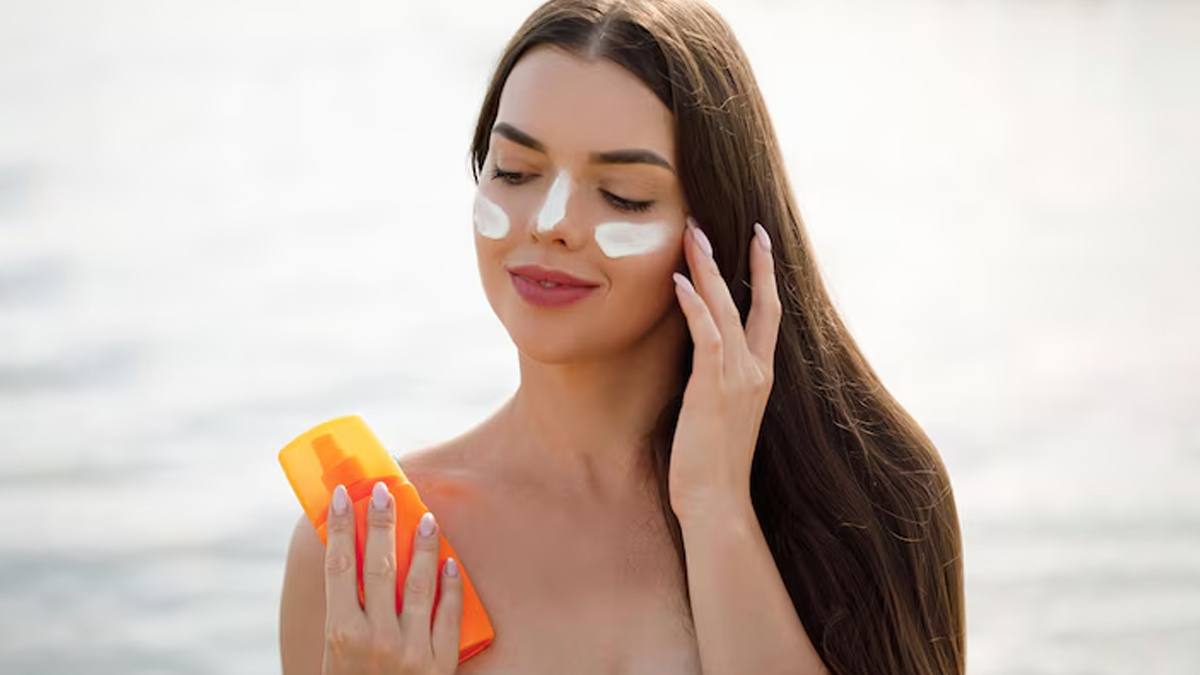
Have you heard the term 'hybrid sunscreen' popping up more often and wondered what all the fuss is about? Sunscreen is non-negotiable for keeping our skin healthy and youthful, guarding against everything from wrinkles to sunspots, and even skin cancer. Sunscreens have always been categorised into two large groups: physical (mineral) and chemical. But times are changing now, and so is the class of sunscreens.
Table of Content:-
We spoke to Dr Vidushi Jain, Dermatologist and Medical Head, Dermalinks, Noida and Ghaziabad, who explained hybrid sunscreen and if it is better than the regular ones you’ve been using.
Understanding Hybrid Sunscreen

Hybrid sunscreens feature a blend of physical and chemical active ingredients. "Physical sunscreens like zinc oxide and titanium dioxide are applied to the skin's surface and cover the skin in a sheathing action by reflecting the rays of the sunbeam away from the skin. Chemical sunscreens like oxybenzone, octinoxate, or avobenzone, on the other hand, absorb the UV rays and dissipate them as heat and evaporate off the skin. With either filter, hybrid sunscreens offer broad-spectrum protection, shielding skin from UVA (ageing) and UVB (burning) light and giving texture and wear to the product," explained Dr Jain.
Also Read: Are There Any Natural Alternatives To Sunscreen? Here's What You Need To Know
Benefits of Using Hybrid Sunscreen

1. More Complete, More Effective Protection
Hybrid sunscreen protects better against UV rays from the sun than most single-filter sunscreens because it contains both types of filters. It offers maximum protection against long and short-wave ultraviolet light.
2. Silky Sooth, Weightless Finish
Older mineral sunscreens often had a gooey or heavy texture on the skin. However, with hybrid sunscreens, a silky smooth, light finish is now achievable, making them easy to apply for everyday use.
3. White Cast
Mineral sunscreens are most likely to produce a chalky white cast, especially on darker skin. However, hybrid sunscreens minimise or eliminate the white cast often, making them cosmetically elegant and suitable for all skin types.
4. Better Under Makeup
With their smoother texture, hybrid sunscreens make great primers or bases under makeup, without the tackiness or pilling.
5. Suitable for Most Skin Types
While mineral sunscreens can clog oily skin and sheer chemical sunscreens can irritate sensitive skin, hybrid sunscreens perform better and are more suitable for overall use.
Also Read: Should You Apply Sunscreen On Infants? Expert Answers
Is Hybrid Sunscreen Better Than The Regular Ones?
-1745320292338.jpg)
"The answer lies in your own skin's needs. For sensitive or allergic skin, a mineral sunscreen may still be the safest option. But for the rest of us who want effective protection with greater comfort, hybrid sunscreens offer a next-generation user experience," said Dr Jain.
They're especially ideal for:
- Individuals who spend most of the day working outdoors
- Individuals who complain about the white cast of mineral sunscreens
- Individuals with medium to darker skin tones
- Makeup users seeking a smooth base
John Hopkins Medicine recommends sunscreen with a minimum SPF of 30 for daily activities. If you plan to be outside for an extended period, opt for sunscreen with an SPF of 60 or higher. Many individuals tend to apply less sunscreen than necessary, so a higher SPF can help make up for this shortfall.
Bottomline
Dr Jain concluded, “Hybrid sunscreens are a result of evolving skincare needs. With them, you get powerful sun protection with a better feel and finish on the skin. If you've struggled with sunscreens feeling too greasy and white or causing irritation, a hybrid sunscreen may be just what your skin needs. Remember, sunscreen isn't just a summer must-have; it's an everyday guard against skin damage buildup. Pick the right one, apply it daily, and your skin will thank you.”
[Disclaimer: This article contains information provided by an expert and is for informational purposes only. Hence, we advise you to consult your professional if you are dealing with any health issue to avoid complications.]
Also watch this video
How we keep this article up to date:
We work with experts and keep a close eye on the latest in health and wellness. Whenever there is a new research or helpful information, we update our articles with accurate and useful advice.
Current Version